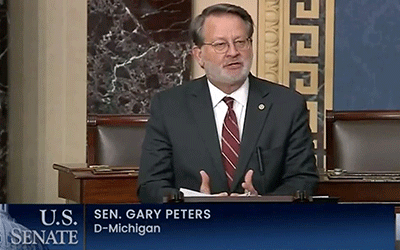FOR IMMEDIATE RELEASE
June 10, 2024
Jeff Johnston, EGLE Public Information Officer, [email protected], 517-231-9304
Alana Murphy, Rewiring America Senior Communications Associate, [email protected]
New online resource will help homeowners and renters calculate energy upgrade savings from the Inflation Reduction Act, state and local programs
Rewiring America launches Michigan Energy Efficient Upgrade Savings Calculator
In Detroit today, Washington, D.C.-based nonprofit Rewiring America launched a Michigan-specific calculator to help homeowners and renters estimate how much they can save with clean energy incentives and tax credits created by the Biden-Harris Administration’s historic Inflation Reduction Act (IRA) and other state, local, and utility programs. The programs cover heat pumps, heat pump water heaters, induction stoves, electric vehicles (EV), EV chargers, and other zero-emissions technologies.
The Michigan Energy Efficient Upgrade Savings Calculator is hosted on the Michigan Department of Environment, Great Lakes, and Energy’s website.
Rewiring America, whose focus is upgrading homes, businesses, and communities from inefficient fossil fuel-powered appliances to high-efficiency/high-performance electric alternatives, estimates that American households can receive $10,600 on average in federal incentives to help convert from fossil fuel-powered appliances and technology to electric-powered replacements that in turn can save households an average of $2,000 a year on energy bills.
By inputting a few details about their households, Michigan residents will get personalized estimates of how much they can save on efficient electric appliances and energy-saving technologies.
“Right now, there are game-changing dollars available for families to make clean energy improvements because of the leadership of the Biden-Harris Administration, our hardworking congressional delegation, Governor Whitmer, and our partners in the Legislature,” said EGLE Director Phil Roos. “Our steps toward a prosperous clean energy future for all Michiganders include both collective and individual actions. This new calculator equips homeowners and renters to make informed decisions about important household upgrades that will save them money on their energy bills, make their homes more comfortable, and engage them in our efforts to address climate change together.”
Michigan is part of the first cohort of states to have its own version of the Rewiring America calculator, with state and local incentives integrated.
“Michigan is ahead of the game in bringing the benefits of the energy transition to families across the state,” said Rewiring America CEO Ari Matusiak. “We look forward to continuing to work in partnership to make these important home upgrades more affordable and accessible to all. With this calculator, households in Michigan are only a few clicks away from the next steps on their electrification journey.”
In other states, the tool already has helped nearly 800,000 Americans understand their eligibility for federal electrification tax credits.
Governor Gretchen Whitmer demonstrated the tool at its official launch today during the Clean Economy and Community Impact Summit, where the Governor; State Chief Climate and Energy Strategist Kara Cook; and other state, federal, business, and community leaders discussed the clean energy economic transformation taking place in the state.
“If we face climate change with climate action, we can lower costs, create jobs, and make more American energy using American workers,” said Governor Whitmer. “The new Rewiring America calculator will show Michigan families how much they can save using incentives from the Biden-Harris administration’s clean energy programs. You can save money on your next home upgrade, whether it’s a furnace, water heater, stove, rooftop solar, or so much more. You can drive down your monthly bill by up to 20%, better protect the air your kids breathe, and support jobs and investment in your local community. I urge every Michigander to take advantage of these cost-saving programs and improve your quality of life.”
The summit focused on the economic transformation underway nationally, in Michigan, and in communities such as Detroit due to the unprecedented public investments from the federal Inflation Reduction Act, Bipartisan Infrastructure Law, and CHIPS and Science Act. These investments, together with Michigan’s historic Clean Energy and Jobs Act, put Michiganders in the driver’s seat to build a clean energy economy that delivers for communities, workers, and businesses.
To build the calculator, Rewiring America received $5 million in funding and a team of 12 Google.org fellows via the philanthropy’s Impact Challenge on Climate Innovation. As part of the pro bono initiative, Google engineers, program managers, user experience designers, and other professionals dedicated six months to assist the nonprofit. The fellows collaborated on technical challenges such as using generative artificial intelligence to speed up public data collection and language translation for RWA’s incentive interface.
The Inflation Reduction Act is the largest investment in climate action in U.S. history. The law is helping American consumers save money while boosting domestic manufacturing and energy independence. In the U.S., 42% of energy-related emissions come from the cars we drive, how we heat and cool our homes, how we heat our water, cook our food, dry our clothes, and how we power it all. Achieving a carbon-neutral economy requires replacing these machines with alternatives powered by clean energy.
Michigan is a national leader in attracting climate- and clean energy-related federal funding. According to Climate Power, Michigan is the No. 1 state in landing clean energy projects from the IRA and in the top five for job creation and overall investment. Tools like the Michigan Energy Efficient Upgrade Savings Calculator will help Michigan families make the most of these federal dollars.
Recently, EGLE received $210.8 million for the state’s Home Energy Rebate Programs, which will be available to families this fall. The Home Energy Rebate Programs will provide funding to lower the up-front cost of whole-home energy efficiency upgrades in single-family and multifamily homes, aiding retrofitting and electrification efforts. The Home and Appliance Electrification Rebates will help finance the up-front cost of efficient electric technologies and appliances in single-family and multifamily homes. People can sign up for program notifications.
For more information on clean energy and climate-related federal funding opportunities, visit EGLE’s climate and energy funding opportunities webpage. |










